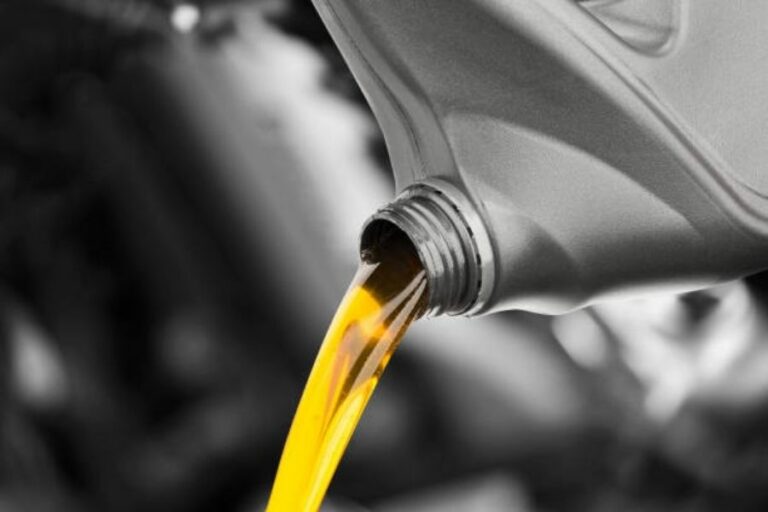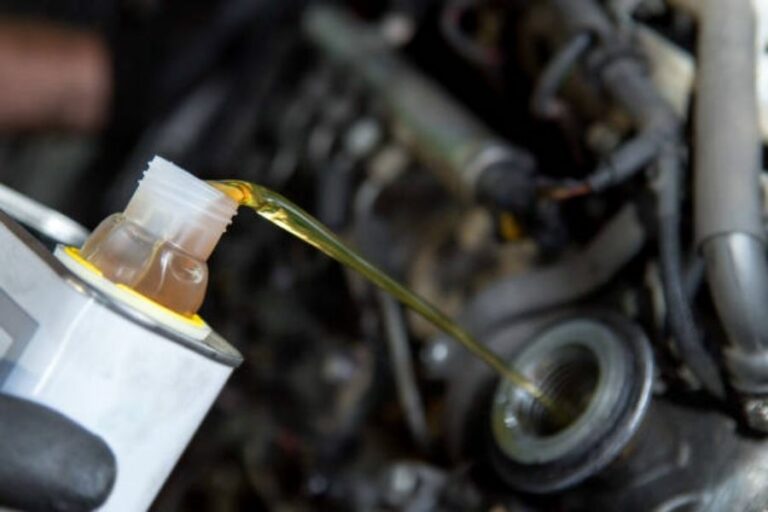What Temperature Is Too Hot For Transmission Fluid? (Expert Explained)
Transmission fluid is made to resist extreme temperatures, However, there is a limitation regarding how hot it can go before losing its function and breaking down.
Generally, the ideal operating temperature range for transmission fluid is around 175-200 degrees Fahrenheit. Once the temperature climbs above 200 degrees Fahrenheit, the fluid degrades rapidly. The likelihood of significant damage increases with each additional 20-degree increase.
To prevent transmission issues caused by burned-out fluid, it’s important to understand its temperature limits. Keep reading for more information.
What Causes Transmission Fluid To Get Too Hot?
The transmission system is one of the most critical components in your vehicle, responsible for the smooth operation of your car. However, it is also one of the most expensive systems to repair if damaged.
Overheated transmission fluid is a common cause of transmission failure. Therefore, it is essential to be aware of the reasons for overheated transmission fluid to prevent such issues.
Low Fluid
Low fluid is one of the main reasons that cause the transmission fluid to get overheated. When the fluid level is low, it will need to work much harder, which can quickly increase the temperature of the liquid.
Low transmission fluid levels might result in insufficient lubrication and cooling of the transmission system.
This can easily lead to overheating as there won’t be enough fluid to dispatch the heat produced by the gears, which can overheat the remaining liquid.
Also, if insufficient fluid exists, the converters may begin to slide, resulting in damage and wear out.
Old and Burned-Out Transmission Fluid
The transmission will quickly overheat if the fluid is burned out or old since it won’t have anything to cool it off.
Over time, transmission fluid breaks down and loses its lubricating properties, becoming thicker and less effective at reducing friction and heat.
Change the transmission fluid immediately if it seems burned or dirty. This suggests that the transmission may have had an overheating incident.
Read Also: Mercon Vs Mercon V: What’s The Best Transmission Fluid?
Driving the Car in Hot Weather
Hot weather can be a significant contributing factor to overheating of transmission fluid. The temperature outside affects the operating temperature of the transmission system.
High temperatures outside can cause the transmission fluid to heat up more quickly.
The transmission fluid might heat up and disintegrate more rapidly in hot weather than under normal circumstances.
The ability of the transmission fluid to lubricate and chill the transmission system decreases as its temperature rises.
This, in turn, can cause the transmission to overheat, ultimately leading to significant damage.
Solenoid Problems
Solenoids are everywhere in transmissions and manage the transmission fluid to regulate the movements. The volume of transmission fluid circulating will not flow adequately if the solenoid fails.
If broken, it may permit excessive fluid flow into or out of the gearbox, leading to overheating of the transmission fluid.
Over time, a faulty solenoid can also build up debris and contamination within the transmission system, further exacerbating the issue.
When the solenoid breaks down, you will notice considerable transmission fluid in the pan. But not enough of it is going through the transmission system to reach where it has to be.
Malfunctioning Cooling System
The cooling system includes the radiator, transmission cooler, and other components that help regulate the temperature of the fluid.
Generally, the radiator through which antifreeze passes is also used to cool automatic transmission fluid.
Less coolant can flow through the transmission cooler when the cooling system malfunctions. Hence, as a result, the transmission fluid cannot be adequately cooled.
Moreover, the cooling system may have leaks that limit its capacity to cool the fluid. A malfunctioning radiator can also lead to overheated transmission fluid.
Overloading Vehicle
Carrying too much weight or towing heavy loads can significantly strain your transmission fluid, causing the fluid to overheat.
Heavily loaded vehicles require more effort from the engine to transfer the extra weight, which may also put more strain on the transmission.
Thus, the harder the transmission works, the hotter the transmission fluid becomes. The increased heat can cause the transmission fluid to break down more quickly,
Read Also: Will Transmission Fluid Eat Radiator Hose
What To Do When Transmission Fluid Becomes Too Hot?
By now, you already know that overheated transmission fluid can cause severe damage to the transmission system. So, when the fluid becomes heated up, you can do a few things.
Check Transmission Fluid
Check the condition and level of the transmission fluid when the car is cooling down. Checking your car’s fluids at least once a month will help you catch problems like low fluid levels and worn-out, unclean, or burned fluid.
Ensure that the fluid appears clean and free of debris. Otherwise, you will need to change the fluid.
Also, verify that the fluid level is appropriate and not excessively low. Add extra liquid if there isn’t enough to raise the level to the proper level.
Add an External Cooling Source
If you live in a country or area where the temperature is hot most of the time, then you should consider adding an external cooling source.
These coolers are also quite effective in cooling the fluid if you often use your car for towing and if you frequently overload your car.
Including a transmission cooler will help in controlling the fluid’s temperature.
A transmission cooler dramatically decreases your transmission’s temperature range when put somewhere between the radiator and the transmission, assisting in avoiding overheating.
These types of transmission cooler are often simpler to attach than the transmission pan and effectively lowers the transmission temperature while constantly cooling the transmission fluid.
Moreover, be sure you replace the coolant in it approximately every two years, as coolants reduce their ability to cool the system with time.
Read Also: Will Transmission Fluid Mess Up A Radiator
Add a Deeper Pan
A deeper transmission pan is a third market upgrade, and it is used in place of a traditional transmission pan. The deeper pan comes with more capacity than the regular version.
It is designed to increase fluid volume in the system and enhance cooling. As a result, you won’t need to have the fluid replaced as frequently.
Adding a deep pan makes it possible to disperse heat and accelerate heat removal from the transmission fluid.
It’s also advantageous for cars in hotter regions since traffic puts much strain on the engine.
Do keep in mind that pans constructed of aluminum disperse heat more effectively than those of steel.
Check For Leaks
It is essential to check the fluid level and inspect the transmission system for leaks. Low fluid levels can cause the transmission to overheat, so it’s crucial to ensure the fluid level is within the recommended range.
If you find a leak in the transmission system, it’s important to have it repaired by a qualified mechanic as soon as possible.
Leaks can cause a drop in fluid level, leading to increased friction and heat, ultimately damaging the transmission system.
Read Also: Will Transmission Fluid Spilled On Radiator Hose
Problems You May Face For Transmission Fluid Overheating
Transmission fluid is critical in adequately functioning a vehicle’s transmission system.
When the transmission fluid overheats, you can face many issues with your car. Keep on reading to know more about these issues.
- Transmission gear slipping
- Damage to the transmission components
- Delay during transmission shifts
- Seals and clutches burn
- Limp-home mode activated
- The burnt smell coming from the transmission fluid
- Discolored or dark transmission fluid
- Warning lights on the dashboard
Tips For Preventing Transmission Fluid Overheating
Transmission fluid overheating can lead to severe problems in your car components, especially in the transmission system, leading to costly repairs. So, follow these tips below to help you prevent transmission fluid overheating in your car.
Do Not Overload Your Car
Overloading your car and putting extra pressure on the transmission system can cause the fluid to work harder. This can lead to overheating the fluid, so avoid overloading your car.
Do Regular Maintenance of Your Car
Regular maintenance, such as fluid and filter changes, can help prevent overheating and other transmission issues.
Always Check the Fluid Level
Low fluid levels can cause overheating of the fluid, so ensure that your transmission fluid is at the right level. So, regularly check your fluid level and top off as needed.
Use the Right Type of Fluid
Always make sure to use the transmission fluid that the manufacturer recommends for your car. An overheated transmission and other issues might result from using the incorrect fluid.
Read Also: In Which Direction Does Transmission Fluid Go Through Radiator
FAQs.
After reading our guide so far, it is common to have some FAQs. Hence, below, we will discuss all the FAQs related to today’s discussion, which will further clear your confusion.
Are 180 degrees too hot for a transmission?
No, transmission fluid can withstand temperatures of 180 degrees Fahrenheit. Most automobiles are thought to operate best with transmission fluid at a temperature between 175-200 degrees Fahrenheit. However, the temperature rises over 200 degrees Fahrenheit and can cause the fluid to overheat.
How often should you change the transmission fluid?
Depending on the vehicle, the kind of transmission, and the manufacturer’s guidelines, the timing of transmission fluid replacement differs. The transmission fluid should generally be changed every 30,000 to 60,000 miles or every 2 to 4 years.
How to tell if my transmission fluid is too hot?
If your transmission fluid is too hot, you can notice many different symptoms. But, the most common signs include a burned smell coming from the fluid, darkish or tainted fluid, dashboard warning lights, and poor transmission functionality.
What makes transmissions last longer?
The transmission in your automobile will ultimately wear out, but if you start taking care of it, you may extend its lifespan. Regular maintenance involves inspecting leaks and replacing the transmission fluid at the manufacturer’s suggested periods.




![Mazda 3 Transmission Fluid Type and Capacity [2003-2023]](https://carfluidpro.com/wp-content/uploads/Mazda-3-Transmission-Fluid-Type-768x512.jpg)

